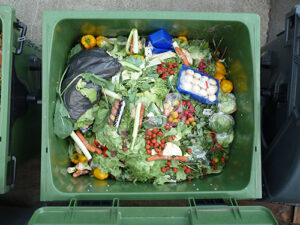Food Waste Reduction
 Institution: University of Maine
Institution: University of Maine
Team: Materials Management
Sponsors:
- The Diana Davis Spencer Foundation (2018)
- UMaine’s Interdisciplinary Undergraduate Research Collaborative (2018-2019)
In January 2017, the Mitchell Center launched the Diana Davis Spencer Partnership for a Sustainable Maine. The ultimate goal of this partnership is to develop, implement and evaluate solutions to complex problems requiring a careful balance between economic development and environmental preservation. The central element of the project’s solutions strategy is to inspire and equip a new generation of engaged, entrepreneurial citizens by providing students with transformative, hands-on experiences in the power of innovative partnerships to create a brighter future.
While one group of Diana Davis Spencer Scholars continues to work on the “Strengthening Coastal Economies” project begun in 2017, a new group of six Scholars was selected in Spring 2018 to develop collaborative projects focused on food waste reduction in Maine. Additional funding from UMaine’s Interdisciplinary Undergraduate Research Collaborative (IURC) is also helping to support this research.
Brie Berry, a Ph.D. student and one of the new Diana Davis Spencer Scholars, has previously worked on solid waste management projects in New York City and Africa. Brie is serving as coordinator for a team of five undergraduate Scholars. One of the team’s first accomplishments was the launch of the Community Waste Toolkit—a web platform showcasing best practices for waste reduction in Maine. Based on previously conducted interviews and outreach with stakeholders from across the state, the Community Waste Toolkit connects knowledge to action by sharing effective strategies for waste reduction with a broad audience.
The 2018 Diana Davis Spencer Scholars working on the Food Waste Reduction project are:
Hannah Nadeau, a freshman in the School of Nursing, is working with nursing professor Deborah Saber on the large but poorly-researched problem of hospital food waste. Her goal is to create a questionnaire for hospitals to determine how they are dealing with food waste. This questionnaire will be used to guide interviews with hospital dietary and environmental managers about the causes and potential solutions to food waste problems.
Andrew Flynn, a third-year Civil and Environmental Engineering major, is working with environmental engineering professor Jean MacRae. His project concerns anaerobic digestion of food waste in which microorganisms break down biodegradable material in the absence of oxygen, and seeks to determine what ratios of waste materials allow for the most efficient digestion process. The ultimate goal is to develop higher yields of methane gas for the production of renewable electricity.
Shayla Kleisinger, a junior in Chemical and Biomedical Engineering, works with food processing professor Balunkeswar Nayak. Her research focuses on the use of biomaterials such as cellulose nanofibers in food packaging to improve the shelf life of food products. The long-term goal of this project is to reduce food waste and plastic use by incorporating biodegradable materials in the packaging.
Skyler Horton, a freshman majoring in Human Dimensions of Climate Change, is working with anthropology professor Cynthia Isenhour to study the concerns of Maine citizens about implementing food systems that minimize waste. Their project is an effort to ensure that food redistribution and waste recovery efforts address citizen’s concerns.
Taylor Patterson, a third-year Ecology and Environmental Science major, is working with economics researcher Travis Blackmer on enhancing the diversion of food waste. Their project focuses on efforts to create a community-based, commercially-viable composting program.
Resources:
- News Article 9/7/2017: Honest Broker – The Mitchell Center helps the Legislature evaluate a bill to reduce food waste and hunger in Maine
- Solutions Issue 5: Focused on Food Waste – Brie Berry extends her reuse work to food redistribution
- News Article 4/2/2019: IURC Funds Four Sustainability Projects
